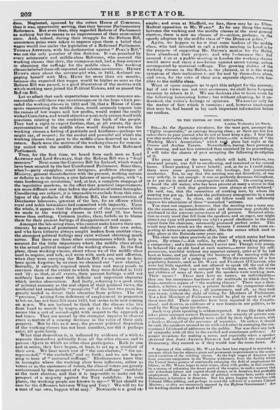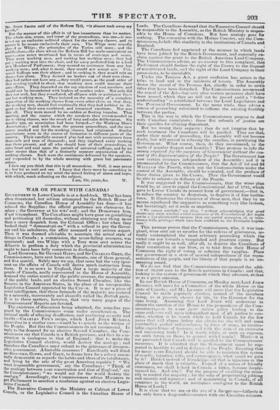TO THE EDITOR OF THE SPECTATOR.
London, Wednesday 1st March. Sin—As the Spectator circulates, for the most part, amongst the " highly respectable," or carriage keeping class • as there are but few subscribers to your journal who do not at least keep a gig; I fear that you flay undervalue the subject of this letter,—viz. a meeting of " the
Working Men's Association," which took place last night at the Crown and Anchor Tavern. Neverthel7ss, having been present at the meeting, and not less interested than surprised by its proceedings, I will take the chance of your accepting the following description of it.
The great room of the tavern, which will hold, I believe, two thousand people, was full to overflowing, and remained so for several hours. Closer packing I never beheld ; and, as far as I could judge, there were none present, below the hustings, but journeymen mechanics. Yet, to say that the meeting was not disorderly, or was very orderly, is not enough : it was so perfectly decorous throughout, as to put me in mind of a congregation at church. On coming away, I heard the old waiter, who has been present at many a storm in that room, say—" I wish that gentlemen were always as well-behaved." He said, too, that the committee of working men, by whom the meeting was got up, had made the preliminary arrangements in a most business-like way. In short, the old fellow could not sufficiently express his admiration of these "unwashed "artisans. You must not suppose, however, that the meeting was a tame one. On the contrary, its remarkable order and decorum may probably be
attributed to the extreme earnestness of all present. Strained atten- tion to every word that fell from the speakers, and an eager, one might almost say (you will presently see why) a proud obedience to the least
signal from the chairman, necessarily produced perfect order. This result may have struck me the more, because I entered the room ex- pecting to witness an uproarious affair, like the scenes which used to take place at the Rotunda some years ago. The chair was taken precisely at the time of which notice bad been
given. By whom ?—Ask rather, by what? By a working printer— a compositor ; and a better chairman I never saw. Though very young, Ile behaved like an old hand at such matters,—never losing his self- possession, watchful without any apparent anxiety, quiet its if he had been at home, and yet directing the business of the meeting with the absolute authority of a judge in court. With the exception of a few popularity-hunters, such as Dr. WADE and FEARGUS O'CONNOR, who were but little regarded, and not allowed to speak till the end of the proceedings, the stage was occupied by working men, with the wives and children of some of them ; and the speakers were working men. Their names ? These men have no names, no individuality— they are but anonymous fractions of the multitude to which they be- long—nameless organs of " the working classes." There was a shoe- maker, a hatter, a carpenter, a printer besides the compositor chair- man, a machine-maker, &c. ; all journeymen, and all, as they took care to say, without the right of voting for Members of Parliament. Not a few Members of Pailiament would be glad to speak as well as these men did. Their speeches have been reported in the Constitu- tional; and deserve, as evidence of a new feature in our politics, to be read by the King upon his throne.
Such very plain speaking is seldom reported. It was like that which
takes place amongst earliest Democrats in the security of private con- versation. All things political were called by their right names, with a fearless disregard of the presence of reporters. Or rather, it should be said, the speakers seemed to vie with each other in outraging the con- ventional falsehood of addresses to the public. Nor was there any lack of sympathy with all this in the excited and unanimous audience. At proper occasions fur making a noise, and especially when a speaker observed that Jons Aturitint ROEBUCK had unfurled the standard of Democracy, they seemed as if they would tear the room down. As Apropos of this subject, Mr. Waal) has been long engaged in maturing a measure which has for object a great and permanent improvement in the econo- mical condition of the working classes. As the high wages of America arise from constant emigration to the Western wilderness, from the facility which the United States possess of continually enlarging the field of employment for labour, so Mr. WARD hopes to raise wages, along with profits, in this country, by a system of colonizing the desert parts of the empire, in such a manlier that our redundant labour and capital should always, as in America, find profitable employment. His aim is that state of political economy here, under which Democracy is harmless in America. But his plans happen to interfere with Colonial Office jobbing, and perhaps to cross the self-love of a certain Cabinet Minister ; so they are strenuously opposed by the Reform Government I Are the working classes so much to blame ? Mr, JOHN SMITH said of the Reform Bill, "it almost took away my
breath."
But the manner of this affair is iNf less importance than its matter. The whole aim, scope, and tenor of the proceediners was one—it was to set up an exclusive noliticel object for the working classes, and to purse" it by means exclusively their own. The Whigs were roundly almost as Whigs; the principles of the Tories still more ; and the middle class—the class whom the Reform Bill has made omnipotent on paper—was never mentioned but in terms of contempt and scorn. They were working men, and nothing but working men ; they had pot 1.1 working man into the chair, and far away preferred him to a lord or a Mernherof Parliament; they wanted no assistance from any but working men; and, what is more, they would not accept any Uni- versal Suffrage was their object ; and in seeking it. they would rely on tbem.aplees alone. They desired no leaders out of their own class ; they had rather not have any,—they would prove, as the good order of that meeting tended to show, that working men could manage their own affairs. They depended on the org niz ition of vast numbers, and would not be incumbered with leaders of another order. Not only did they not seek, but they renurliated, all alliance with or assistance from any but warking men. They insisted on the necessity of "it complete separation of the working classes from every other class, so that they, the working men, should feel continually that they had nothing to de- pend on but their own combined, and organized exertions. Nor was this all. They were moved by no sudden or fleeting impulse. That meeting, and the course which the speakers then recommended to the working classes, wns the result of long and calm deliberation. Six months ago, an association had been formed—" the Working Men's Association ;" and with them the present proceedings, and the new course marked out for the working classes, bad originated. Similar associations were in the course of formation in different parts of the country. Their carefully-matured p1sn had met with acceptance from thoueinds and tens of thousands ; and they implored every working man there present, and all who should hear of their proceedings, to enter heart and soul upon the pursuit of universal suffrage, and by no other means than that of a distinctly separate organization of the working classes. Such were the sentiments delivered by the speakers, and responded to by the whole meeting with grave but passionate ardour.
I dare say you think that this is all moonshine. Well, it may prove so; but let us wait and see. I fancy that there must be. something in it, to have produced on my mind the mixed feeling of alarm and hope, with which, much reflecting on the subject, I am, Sir, yours, &c. W.



























 Previous page
Previous page